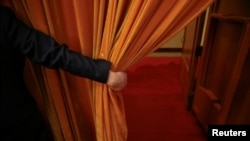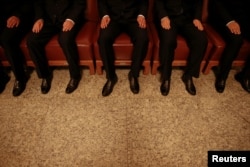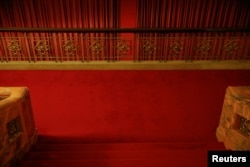Every March, the curtains go up in Beijing for two major events in the political calendar.
The "lianghui," or "two meetings," as they are known, attract thousands of delegates from across the country for sessions of the National People's Congress and the Chinese People's Political Consultative Conference.
In a country where most key decisions are made behind closed doors, even a peek through half-closed curtains is rare for photographers working for foreign news organizations in China.
The annual gatherings include numerous highly choreographed events, many taking place inside the Great Hall of the People to the west of Tiananmen Square in the heart of Beijing.
Built in less than a year in 1959 to celebrate the 10th anniversary of the founding of the People's Republic, the main auditorium can seat 10,000 people.
Parliament's largely ceremonial advisory body, the Chinese People's Political Consultative Conference, begins its meetings Friday, in sessions that run parallel with the NPC. Made up of business magnates, artists, monks, noncommunists and other representatives of broader society, it has no legislative power, however.
Some delegates and officials attending the "two meetings" wear traditional ethnic clothing, while others are in military uniforms or simple black suits, a color that contrasts with the dominant red of the Great Hall.
Exact details of the topics of discussion, including economic growth targets and the budget, are kept under tight wraps ahead of the sessions.
On Sunday's opening day of the NPC, Premier Li Keqiang will announce key economic targets in his state-of-the-nation-style address. The meeting will end with Li's carefully choreographed annual news conference.
This is not China's biggest political event of the year, though.
Far more important is the autumn party congress, at which President Xi Jinping will unveil a new generation of senior leaders, positions that entail a lot of behind-the-scenes jockeying at parliament.







